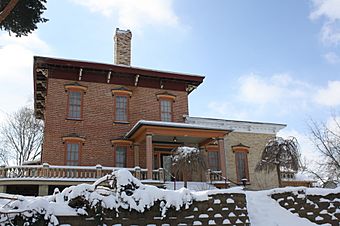Daniel C. Van Brunt House facts for kids
Quick facts for kids |
|
|
Daniel C. Van Brunt House
|
|

Daniel C. Van Brunt House
|
|
| Location | 139 W. Lake St., Horicon, Wisconsin |
|---|---|
| Area | less than one acre |
| Built | 1858 |
| Architect | Wiseman Brothers |
| Architectural style | Italianate |
| NRHP reference No. | 81000040 |
| Added to NRHP | September 14, 1981 |
The Daniel C. Van Brunt House is a historic building in Horicon, Wisconsin. It's a cool old house that tells a story about the people who lived there. This house is special because of its unique design and the important inventions linked to one of its owners.
Contents
History of the Van Brunt House
Who Built This Historic Home?
The Daniel C. Van Brunt House was first built in 1858. It was originally designed for a dentist named William Decker. The house shows off a style called Italianate architecture. This style was popular in the mid-1800s. It often features wide eaves, decorative brackets, and tall windows.
Daniel C. Van Brunt's Connection
In 1868, Daniel C. Van Brunt moved into the house. He was a wagon builder by trade. But Daniel and his brother were also clever inventors. They created something very important for farming.
The Amazing Seed Seeder
Daniel C. Van Brunt and his brother designed the first mechanical broadcast seeder. This machine helped farmers plant seeds much faster. Before this invention, farmers had to scatter seeds by hand. The seeder made farming easier and more efficient. It was a big step forward for agriculture in the U.S.
Later Life of the House
After being a family home, the building later served the community. It became the Horicon Community Center. This means it was a place where people could gather for different activities.
A Recognized Landmark
The Daniel C. Van Brunt House is officially recognized as a historic place. It was added to the National Register of Historic Places in 1981. This list includes buildings, sites, and objects important to American history. It was also listed on the State Register of Historic Places in 1989. These listings help protect the house for future generations.
 | Ernest Everett Just |
 | Mary Jackson |
 | Emmett Chappelle |
 | Marie Maynard Daly |

